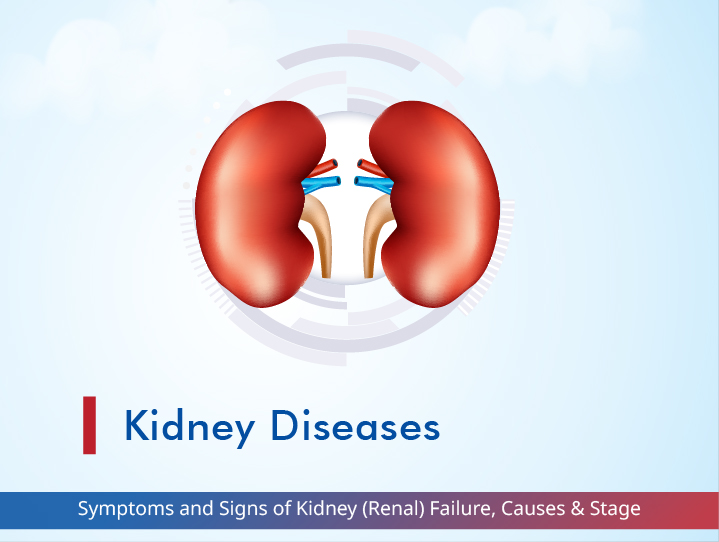What is Kidney Infection?
Kidney infections, or pyelonephritis, are serious health concerns. Sometimes, they can have significant consequences if left untreated. These infections occur when microorganisms such as bacteria enter the urinary tract, and from there, they travel up to one or both kidneys. This microorganism can cause inflammation and potentially lead to more severe complications.
Understanding the root causes, symptoms, and prevention strategies for kidney infections is essential for maintaining overall urinary tract health. If not treated properly, a kidney infection can result in permanent kidney damage, or the bacteria can spread to the blood (a condition called sepsis), resulting in a dangerous infection.
Causes of Kidney Infection
The most common cause of kidney infection is bacteria, particularly Escherichia coli, entering the urinary tract and travelling up to the kidneys, says Dr. Sunil R. These bacteria enter the urinary tract through various ways, such as poor hygiene, sexual activity, or the spread of an existing bladder infection. The other causes may involve:
- Blockages in the urinary tract, such as kidney stones or prostate enlargement, can obstruct urine flow, resulting in an environment where bacteria can thrive.
- The vesicoureteral Reflux (VUR) condition, where urine flows backwards from the bladder into the ureters and kidneys, can lead to recurrent kidney infections.
Risk factors for Kidney Infection
The following factors can increase the possibility of kidney infections:
- Women are more susceptible to kidney infections and UTIs due to their shorter urethra. The shorter-sized urethra makes it easier for bacteria to reach the bladder and kidneys.
- Congenital or acquired kidney and urinary tract abnormalities can increase the chance of kidney infections.
- The long-term use of a urinary catheter can allow bacteria to enter the urinary tract, increasing the possibility of kidney infection.
- People with weakened immune systems, like those with HIV or diabetes, are more susceptible to kidney infections.
Signs of Kidney Infection
Kidney infections can exhibit various symptoms depending on the severity of the infection, but they often include:
- Intense pain or discomfort in the back, side, or lower abdomen
- Fever and chills
- Nausea and vomiting
- Burning sensation or pain during urination
- Frequent urge to urinate
- Blood or pus in the urine
- Cloudy or foul-smelling urine
- Fatigue and general malaise
Diagnosis of Kidney Infection: Tests and Procedures
To diagnose a kidney infection, doctors may perform a variety of tests and procedures, including:
- Urine Analysis: This test examines the urine for bacteria, WBCs, and other infection indicators.
- Urine Culture: The doctor sends the urine sample to a laboratory to detect the specific type of bacteria causing the infection.
- Blood Tests: The blood analysis can tell your doctor the severity of the infection and rule out other underlying conditions.
- Imaging Tests: Techniques like ultrasound, CT scan, or MRI may be used to visualise the kidneys and identify structural abnormalities or obstructions.
Treatment Options for Kidney Infection
The primary treatment for a kidney infection typically involves an antibiotic course, which is prescribed based on the type of bacteria. In milder cases, oral antibiotics may be sufficient, while more severe infections may require intravenous (IV) antibiotics administration in a medical setting is recommended.
In addition to antibiotics, other supportive measures may be recommended, such as:
- Increased fluid intake to promote urination and flushing of the urinary tract
- Pain medication to alleviate discomfort
- Bed rest and avoidance of strenuous activity
Complications and Long-Term Effects of Kidney Infection
If left untreated or if the infection is not managed correctly, a kidney infection can lead to several serious complications, including:
- Kidney Abscess: The formation of a pocket of pus within the kidney tissue
- Sepsis: It is a potentially life-threatening condition which occurs when the infection spreads throughout the patient’s body
- Chronic Kidney Disease: Repeated or persistent kidney infections can cause permanent damage to the kidneys over time
- Renal Scarring: Scarring of the kidney tissue, which can impair kidney function
Prevention of Kidney Infections: Steps to Take
Fortunately, there are several steps people can take to lower the risk of developing a kidney infection:
- Practice Good Hygiene: Use proper cleaning and wiping techniques. To prevent bacteria from reaching the urethra to the rectum, wipe from front to back after urinating and after having a bowel movement.
- Stay Hydrated: Drink plenty of fluids, particularly water, to help flush out the urinary tract.
- Urinate Regularly: Avoid holding in urine, as this can allow bacteria to multiply.
- Avoid Irritants: Avoid products that irritate the urinary tract, such as certain feminine hygiene products or scented soaps.
- Manage Underlying Conditions: Properly managing any medical conditions, such as diabetes or kidney stones, may increase the risk of kidney infections.
When to Seek Medical Help
It’s essential to seek medical attention if you experience kidney infection symptoms. Prompt and proper treatment can prevent the spread of the infection and avoid potential complications. Some key signs that it’s time to see a doctor include:
- Persistent or worsening back pain, abdominal pain, or fever
- Frequent, painful, or burning urination
- Blood or pus in the urine
- Nausea, vomiting, or signs of dehydration
Conclusion
Kidney infections are serious health concerns that require prompt attention and proper treatment. By understanding the causes, symptoms, and prevention strategies, one can take proactive measures to protect the urinary tract health and reduce the chance of developing a kidney infection. Remember, if you experience any concerning symptoms, don’t hesitate to seek medical care—your health and well-being are too important to ignore.











